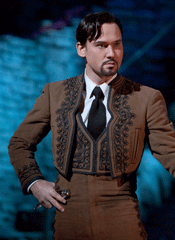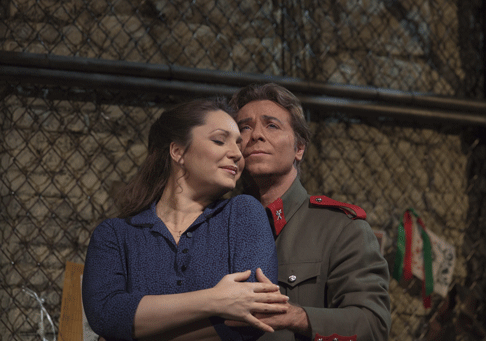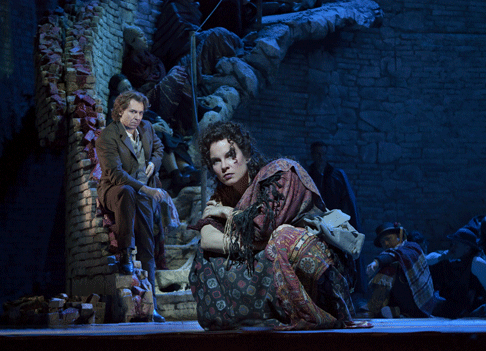![Elina Garanča; as Carmen [Photo by Ken Howard courtesy of The Metropolitan Opera]](http://www.operatoday.com/Garanca_Carmen_Met.gif)
17 Jan 2010
Carmen at the MET
Elina Garanča conceals her gleaming gold tresses beneath a curly black wig to sing Carmen.
English Touring Opera are delighted to announce a season of lyric monodramas to tour nationally from October to December. The season features music for solo singer and piano by Argento, Britten, Tippett and Shostakovich with a bold and inventive approach to making opera during social distancing.
This tenth of ten Live from London concerts was in fact a recorded live performance from California. It was no less enjoyable for that, and it was also uplifting to learn that this wasn’t in fact the ‘last’ LfL event that we will be able to enjoy, courtesy of VOCES8 and their fellow vocal ensembles (more below …).
Ever since Wigmore Hall announced their superb series of autumn concerts, all streamed live and available free of charge, I’d been looking forward to this song recital by Ian Bostridge and Imogen Cooper.
The Sixteen continues its exploration of Henry Purcell’s Welcome Songs for Charles II. As with Robert King’s pioneering Purcell series begun over thirty years ago for Hyperion, Harry Christophers is recording two Welcome Songs per disc.
Although Stile Antico’s programme article for their Live from London recital introduced their selection from the many treasures of the English Renaissance in the context of the theological debates and upheavals of the Tudor and Elizabethan years, their performance was more evocative of private chamber music than of public liturgy.
In February this year, Albanian soprano Ermonela Jaho made a highly lauded debut recital at Wigmore Hall - a concert which both celebrated Opera Rara’s 50th anniversary and honoured the career of the Italian soprano Rosina Storchio (1872-1945), the star of verismo who created the title roles in Leoncavallo’s La bohème and Zazà, Mascagni’s Lodoletta and Puccini’s Madama Butterfly.
Evidently, face masks don’t stifle appreciative “Bravo!”s. And, reducing audience numbers doesn’t lower the volume of such acclamations. For, the audience at Wigmore Hall gave soprano Elizabeth Llewellyn and pianist Simon Lepper a greatly deserved warm reception and hearty response following this lunchtime recital of late-Romantic song.
Collapsology. Or, perhaps we should use the French word ‘Collapsologie’ because this is a transdisciplinary idea pretty much advocated by a series of French theorists - and apparently, mostly French theorists. It in essence focuses on the imminent collapse of modern society and all its layers - a series of escalating crises on a global scale: environmental, economic, geopolitical, governmental; the list is extensive.
For this week’s Live from London vocal recital we moved from the home of VOCES8, St Anne and St Agnes in the City of London, to Kings Place, where The Sixteen - who have been associate artists at the venue for some time - presented a programme of music and words bound together by the theme of ‘reflection’.
'Such is your divine Disposation that both you excellently understand, and royally entertaine the Exercise of Musicke.’
Amongst an avalanche of new Mahler recordings appearing at the moment (Das Lied von der Erde seems to be the most favoured, with three) this 1991 Mahler Second from the 2nd Kassel MahlerFest is one of the more interesting releases.
‘And there was war in heaven: Michael and his angels fought against the dragon; and the dragon fought and his angels, And prevailed not; neither was their place found any more in heaven … that old serpent … Satan, which deceiveth the whole world: he was cast out into the earth, and his angels were cast out with him.’
If there is one myth, it seems believed by some people today, that probably needs shattering it is that post-war recordings or performances of Wagner operas were always of exceptional quality. This 1949 Hamburg Tristan und Isolde is one of those recordings - though quite who is to blame for its many problems takes quite some unearthing.
There was never any doubt that the fifth of the twelve Met Stars Live in Concert broadcasts was going to be a palpably intense and vivid event, as well as a musically stunning and theatrically enervating experience.
‘Love’ was the theme for this Live from London performance by Apollo5. Given the complexity and diversity of that human emotion, and Apollo5’s reputation for versatility and diverse repertoire, ranging from Renaissance choral music to jazz, from contemporary classical works to popular song, it was no surprise that their programme spanned 500 years and several musical styles.
The Academy of St Martin in the Fields have titled their autumn series of eight concerts - which are taking place at 5pm and 7.30pm on two Saturdays each month at their home venue in Trafalgar Square, and being filmed for streaming the following Thursday - ‘re:connect’.
The London Symphony Orchestra opened their Autumn 2020 season with a homage to Oliver Knussen, who died at the age of 66 in July 2018. The programme traced a national musical lineage through the twentieth century, from Britten to Knussen, on to Mark-Anthony Turnage, and entwining the LSO and Rattle too.
With the Live from London digital vocal festival entering the second half of the series, the festival’s host, VOCES8, returned to their home at St Annes and St Agnes in the City of London to present a sequence of ‘Choral Dances’ - vocal music inspired by dance, embracing diverse genres from the Renaissance madrigal to swing jazz.
Just a few unison string wriggles from the opening of Mozart’s overture to Le nozze di Figaro are enough to make any opera-lover perch on the edge of their seat, in excited anticipation of the drama in music to come, so there could be no other curtain-raiser for this Gala Concert at the Royal Opera House, the latest instalment from ‘their House’ to ‘our houses’.
"Before the ending of the day, creator of all things, we pray that, with your accustomed mercy, you may watch over us."
![Elina Garanča; as Carmen [Photo by Ken Howard courtesy of The Metropolitan Opera]](http://www.operatoday.com/Garanca_Carmen_Met.gif)
Elina Garanča conceals her gleaming gold tresses beneath a curly black wig to sing Carmen.
Nearly everything else is on display, from the legs she bathes shamelessly while singing the “Habañera” to the shoulders she bares — in daylight hours? in Spain? — in her ruffled Act IV gown. As the Latvian mezzo soprano is a beautiful woman, a fine actress and dancer with a voice of great warmth and sheen — and fill-the-house power when she chooses to unleash it — no one could object to her performance as Bizet’s eternal Gypsy. True, she is on the sexually aggressive side among Carmens and I find more convincing the casual approach of Olga Borodina, unimpressed by the ogling men around her. Borodina’s Carmen seemed her own woman, making her own choices, one of which might be love. This seems a less cliché way of playing the character. Most Carmens work too hard, as if men’s opinions mattered to them, and Garanča, though with her looks she hardly has to work — anyone would stare — edges towards that sort of show-off Carmen. I presume she does things like snap her cleavage from stage center because she has been directed to do so and because the performance was the camera-dress, the last before the live high-definition telecast.
> Mariusz Kwiecien as Escamillo
Mariusz Kwiecien as Escamillo
Nor did Garanča’s self-conscious sex appeal get in the way of
her singing: The “Habañera” was a parade, the
“Seguidilla” intimate, the dance for Don José very hot, the
fortune-telling very earthy — crouched over her cards, lacking any sort
of glamour, she held every eye and ear in the house. She was not only the
centerpiece but the only vocally irreproachable star of the performance.
Roberto Alagna, who used to be a first-rate Don José, sounded strained, flat on
exposed notes (such as the last of “Dragon d’Alcala”), and
ill-adjusted to register breaks, though of course he had the best French of the
evening. His acting was passionate, and he pulled himself together for a
murderous final confrontation. Barbara Frittoli had trouble placing her notes
in the Act I duet with Alagna, sounding uncertain and lacking force, though she
brought down the house in Act III. Mariusz Kwiecien looked elegant as
Escamillo, but sang with that rough bark he often uses these days, instead of
the wonderful — often wonderfully sinister — leggiero sound he
makes when singing Mozart. Small roles were filled ably and, in the case of
Keith Miller, a commanding Zuniga, rather better than that.
I’ve been bitching for some time about new Met productions that are not only weird but whimsically so, so that future performers will be straitjacketed into their weirdness; so when a new production like this comes along of one of the repertory staples, a production that could easily be inhabited by the varying interpretations of many singers, I’d be rank ungrateful to complain that it lacks a point of view. Richard Eyre has chosen to tell Bizet’s story — not his own irrelevant story — in handsome stage pictures with no interpolated funny business, and I applaud. Even posing for a photographer in Act IV comes at a moment when it does not interrupt the music and the character — Escamillo — might believably pose for a photographer.
 Barbara Frittoli as Micaela and Roberto Alagna as Don José
Barbara Frittoli as Micaela and Roberto Alagna as Don José
What did irritate me a bit — but this is part of the standard approach to the classics in our era — is that the direction has tightened the screws of sexual and other kinds of brutality. Soldiers cannot casually flirt with naïve Micaela — they threaten to rape her the moment she appears, and she narrowly escapes. The smugglers do not gallantly tie Zuniga up in their den — they torture him a bit just for the hell of it, while singing the gallant phrases of the superb Meilhac and Halévy libretto. The period of the piece has been advanced, it seems, to the era of Spain’s Second Republic, just before the Civil War, and perhaps we are to understand the tension between soldiers and civilians, smugglers and the law, as a foretaste of the horrors to come — I don’t know.
 Elina Garanča as Carmen and Roberto Alagna as Don José
Elina Garanča as Carmen and Roberto Alagna as Don José
Two dancers, perhaps representing archetypal Male and Female or Yang and Yin or the infertile stage director and his Muse or a desperate attempt to give Christopher Wheeldon something to do, make a nuisance of themselves during the preludes to Acts I and III.
Yannick Nézet-Séguin conducted with terrific verve and snap, and I would have preferred to concentrate on his music-making when those dancers were making such a spectacle of themselves. The Act III prelude, in particular, is such a lovely, graceful mountain pastorale and leads so perfectly into the scene of shattering bliss that follows that staging it seems wildly intrusive.
John Yohalem